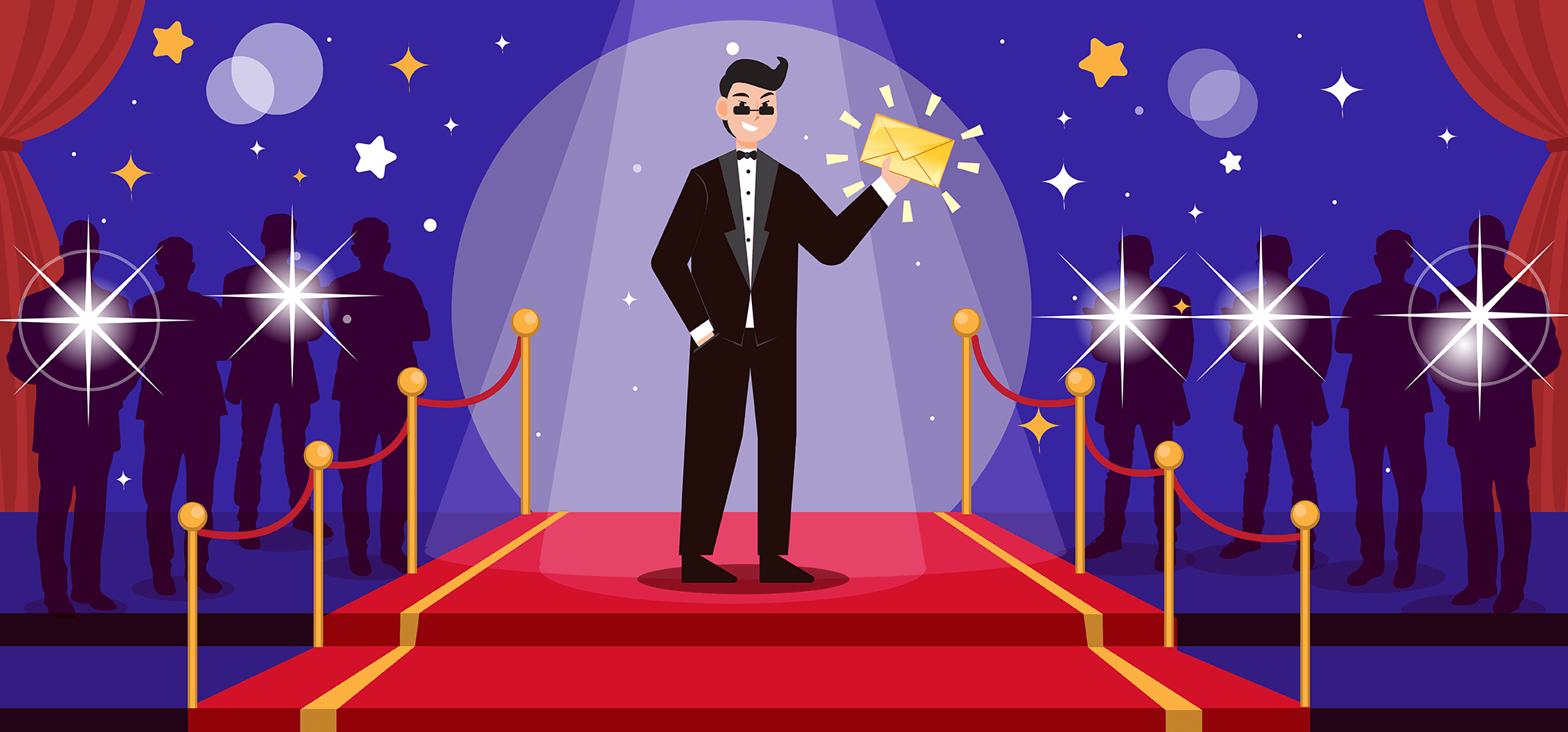
The Star Story Solution formula is likely the most storytelling-driven cold email copywriting strategy you’ll ever use.
Fortunately, storytelling can be an incredibly effective sales technique — when it’s done right. It can hook a recipient emotionally and form a quick, powerful, personal relationship that drives fantastic results.
But when it’s done wrong, you’re going to wind up with a cold email that’s much less compelling than more straightforward copywriting approaches (like AIDA, PAS, and Star Chain Hook).
And while there are similarities between the Before After Bridge copywriting method and Star Story Solution, the latter is much more focused on sharing one heroic journey to success.
In this article, I’ll cover the keys to writing Star Story Solution cold emails that grab a prospect, draw them in, and compel them to take action.
I’m also going to analyze a Star-Story-Solution cold email I received and rework it to create a more effective template to show you this framework in action.
Star Story Solution: Table of Contents
- What Is the Star Story Solution Copywriting Method?
- 1. Star: How I Faced a Challenge Just Like You’re Facing Right Now
- 2. Story: The Journey Through Failed Solutions and False Hope to an Epiphany
- 3. Solution: The Mega Happy Ending That Solves Our Star’s Problem Once and For All
- 4. Call-to-Action: With the Problem Solved, Time to Close the Deal
- “The Sequel”: Automated Follow-Up Ideas for Star Story Solution
- Star Story Solution Copywriting for Cold Email: Takeaway and Next Steps
What Is the Star Story Solution Copywriting Method?
Star Story Solution is a copywriting technique that uses storytelling to emotionally engage a reader by describing how someone who was once in their shoes took a journey and ultimately found the ideal answer to their problem.
The elements of the email are:
- The Star, who is the main character of the story, facing the same problem as the prospect receiving the message.
- The Story, which covers the journey the character took as they tried and tried to fix the problem.
- The Solution, which is what the character did that finally worked (aka using your product or service).
The email should also then include a call-to-action to give the prospect their “next step” to take so they can achieve the same outcome as the Star.
The Star Story Solution method is often at its most effective with a founder-driven product or service telling a first-person story — where you had the problem, toiled endlessly to find the solution, finally found it (or created it), and now you’re sharing it.
And while most cold emails are ruthlessly succinct, the Star Story Solution method is one scenario where you might find more success going a little bit longer with your copy.
You don’t have to — but if you’ve hooked someone with a good story, sometimes they won’t want you to get in and out in the standard 150 words or less.
1. Star: How I Faced a Challenge Just Like You’re Facing Right Now
Good storytelling doesn’t matter if you’re telling the story to the wrong person.
For this cold email copywriting method to work, you’ll need to apply the same fundamental principles as you do with every other copywriting method. That is: You need to understand your customer’s pain point.
Because even though the “Star” character in your email is going to be you (or another character) — the real Star is the prospect receiving the email.
They need to immediately put themselves in the Star’s shoes. Whatever big problem the star has at the beginning of the email? That’s the big problem the prospect should be facing now.
We need to see the Star at the end of their rope. They have a problem. They know they have a problem. It’s eating at them. And that’s their “before” world… which sets up the rest of the email, taking us on the journey to the “after.”
How does personalization factor in?
Star Story Solution lends itself less to mail merge personalization than a lot of the other cold email copywriting techniques you might use. After all, you’re telling a story about yourself (or a character) — not the recipient.
Sure, the Star is a not-so-thinly-veiled avatar for the recipient. But you’re still writing about someone else.
There are, however, still opportunities for personalization here — and a necessity for it.
First, the subject line is a good place for personalization.
For instance, let’s say you’re selling social marketing services. Your subject line could be: “How I finally got 10,000 loyal Instagram fans (and {BusinessName} can too).”
But second, and more important, you can personalize by showing you genuinely understand the prospect’s pain point. If you show you’re not just sending a generic mass email but you’re targeting them specifically because you understand their unique business (its size, its challenges, its needs) — that’s personalization.
Subject lines in Star Story Solution emails
The subject line of a Star Story Solution email needs to be a hook that sets up what the prospect is about to read.
In other words, this isn’t a situation for one of those popular generic cold email subject lines like “Quick question” or “Want to increase revenue for {BusinessName}?”
Try to present a teaser for the story (and the solution) that will make the prospect want to open the email to read more.
Notice in the example I gave a few paragraphs ago I began the subject line with “How I finally” — that’s a good opening for a Star Story Solution subject. It presents the solution while indicating there was a journey involved.
It’s ok to make the subject line a spoiler for the end of the story. Because the recipient doesn’t know how you’re going to arrive at that solution — if they had the solution, they wouldn’t have this current pain, and they wouldn’t need your help.
Putting together the Star portion of a cold email
Throughout this article I’m going to share an actual Star Story Solution email I received. I’ll point out where it’s not quite getting things right. And then I’ll write a new version that better uses this technique for a more effective message.
The Star in the original email I received
Subject: I had to hire a salesman yesterday. Yes, had to.
Message: Sam,
I’ve been getting so many reaches for our marketing services I couldn’t keep up with them. True story.
So I hired a guy.
I knew I could get more clients if I was out there on social media. But I never had the PR power behind my social media before.
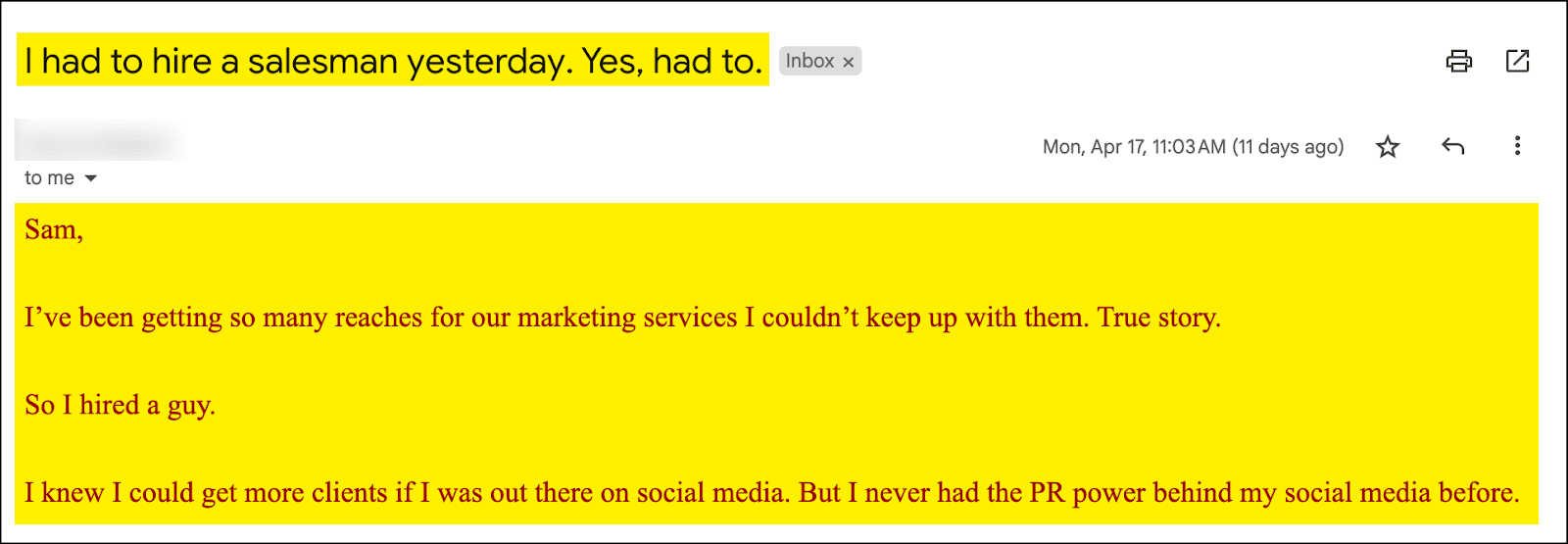
This email is a bit all over the place. Basically, it’s a guy from a marketing agency who’s an affiliate selling a social media PR software product. And he’s using his personal example to demonstrate why the software is effective.
I actually like his subject line. Though it’s not personalized at all to me — and doesn’t exactly speak to me and my particular business — it is an eye-catching subject and one that fits a Star Story Solution cold email.
The rest of the Star section, however, misses the mark. He goes with the technique of reiterating the “I hired a salesman” bit at the top of the email. Perhaps he thought that was effective, but he already jumped to the end of the story with the subject line. I don’t need him to jump there again at the beginning of the message itself. (Especially because, as you’ll see later, he does not repeat this Solution in in the correct spot later in the email.)
From there, the remainder of the Star section is pretty weak as well.
Getting more clients by being “out there on social media” isn’t a real pain point for me. And having “PR power” behind social media is never something I’d really considered — nor something I’d ever believed was a harbinger of business success. He needs to prove that to me.
Plus he’s making a lot of logic leaps here. We went from a salesperson to social media to PR awfully quick, and those aren’t three institutions I necessarily see flowing into each other in this manner.
So while I like the idea of having clients beating down my door so aggressively that I have no choice but to hire someone to handle them… this roundabout path via social media PR seems odd to me.
That means there are two fundamental problems for me with this Star section.
- I can’t put myself in the Star’s shoes.
- I’m not finding the Star a particularly compelling or credible main character.
The subject line was a good hook… but he lost me after that.
My rewrite
Here’s how I’m going to rewrite this email to do a better job getting me into the story.
Subject: I had to hire a salesperson yesterday. Yes, had to.
Message: {FirstName},
I didn’t get into marketing to spend all my time hustling for clients. I’m sure you didn’t get into {Industry} for that either — you wanted to {Task}.
But that’s where I found myself last year. Endlessly fighting for customers, rarely ever getting to work on the stuff I loved. The stuff I was good at. The stuff I was excited to wake up to work on every day.
I was frustrated. Wasn’t there any way I could get new clients to find me and reach out to me instead?
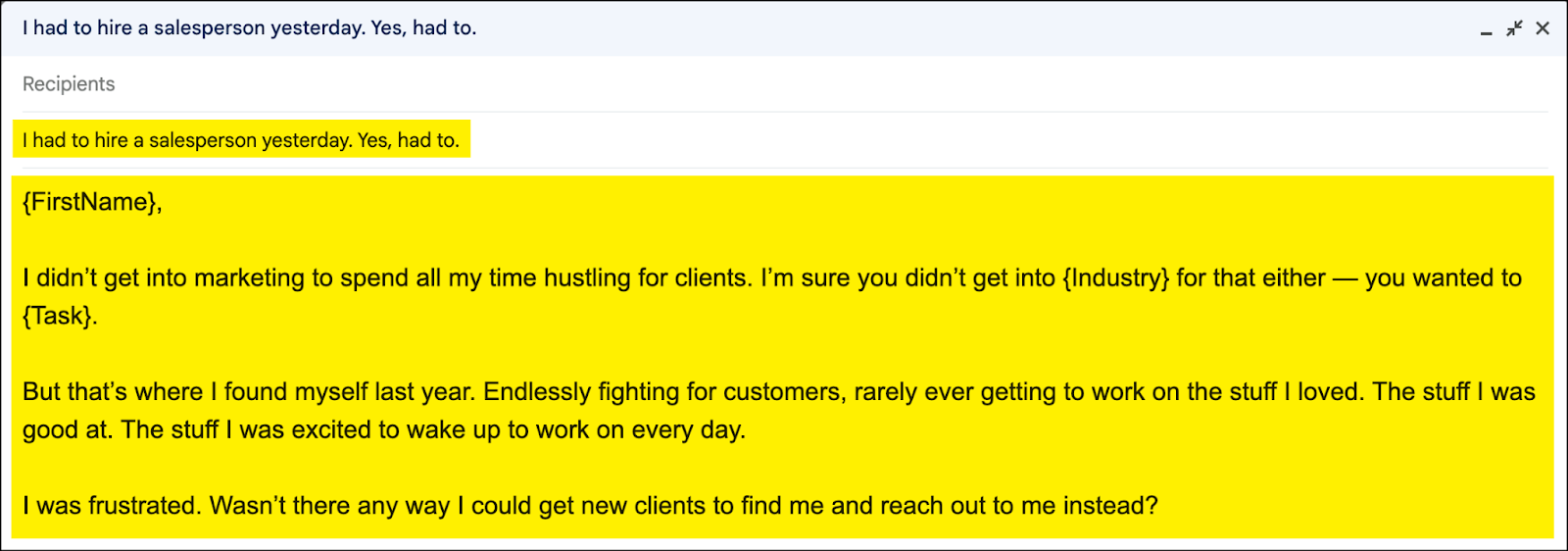
I’ve reframed the Star here quite a bit.
I kept the subject line (though I did make the inclusivity tweak from salesman to salesperson) because I like how it sets up the email.
In fact, the subject line gives me the freedom to spread my storytelling wings a little bit here. Normally with cold email I’d get in and out as quick as possible — but as I mentioned earlier in this article, since I’m telling a story, I’m not afraid of going a little longer because I know I’m getting the recipient on the hook.
I also added some hefty personalization to the Star section here. I felt it was important with the story to leave no doubt about how the prospect could be in the Star’s shoes.
So for the personalization section, I’m hitting what I believe is the actual pain point of the prospect. I don’t think their pain is not having a PR engine behind their social media, like the original email suggests.
I believe their pain is: They started a service business doing something they loved and at which they excelled. But now, they spend far too much time grinding for customers rather than doing what they love.
For instance, if this email was going to a copywriter, the mail merge tags on my Google Sheet might be: “I’m sure you didn’t get into the writing business for that either — you wanted to write brilliant copy.”
And at the end of this revised Star section, I set up the journey. Now that I’ve established the Star’s problem, I also frame the Solution I’m after. My desired result is inbound leads, rather than all outbound sales work. That’s what my Star is searching for during the Story.
2. Story: The Journey Through Failed Solutions and False Hope to an Epiphany
The Story portion of a Star Story Solution email needs to be just that: A story.
Stories are compelling because they have ups and downs. They have twists and turns. They have false triumphs and dark moments but, ultimately, our hero triumphs.
It’s easy to ignore all that when you’re writing a cold email; after all, you’re selling a B2B service, not writing the next Divergent series.
But you shouldn’t neglect the most basic of storytelling beats. For your Story to work, it needs to be compelling — and for it to be compelling, it needs to hit the storytelling notes that our brains are programmed to love.
That’s why a good Story section should often include:
The “obvious” solutions you tried — which failed you (much like your recipient has probably tried them with little success).
A solution that really seemed like it was going to work, but let you down just like all the others, leaving you feeling like the problem was hopeless.
An epiphany, where you heroically discovered a new path. Whether this was a solution you came up with yourself or that you found through tireless effort, as the hero, you earned this epiphany through all the earlier struggles.
Optionally, if it makes sense for the story, some early signs of success post-epiphany. You don’t want to fully reveal the “after” world yet — that comes in the Solution — but you may want to tease it.
Putting together the Story portion of a cold email
Here’s the Story in the email I received, as well as the revisions I’ve made.
The Story in the original email I received
Message: It happened after I started working with this company, [redacted] and their PR kit. Take a moment and click on the button below. Watch the video and check out all the things this PR kit does.
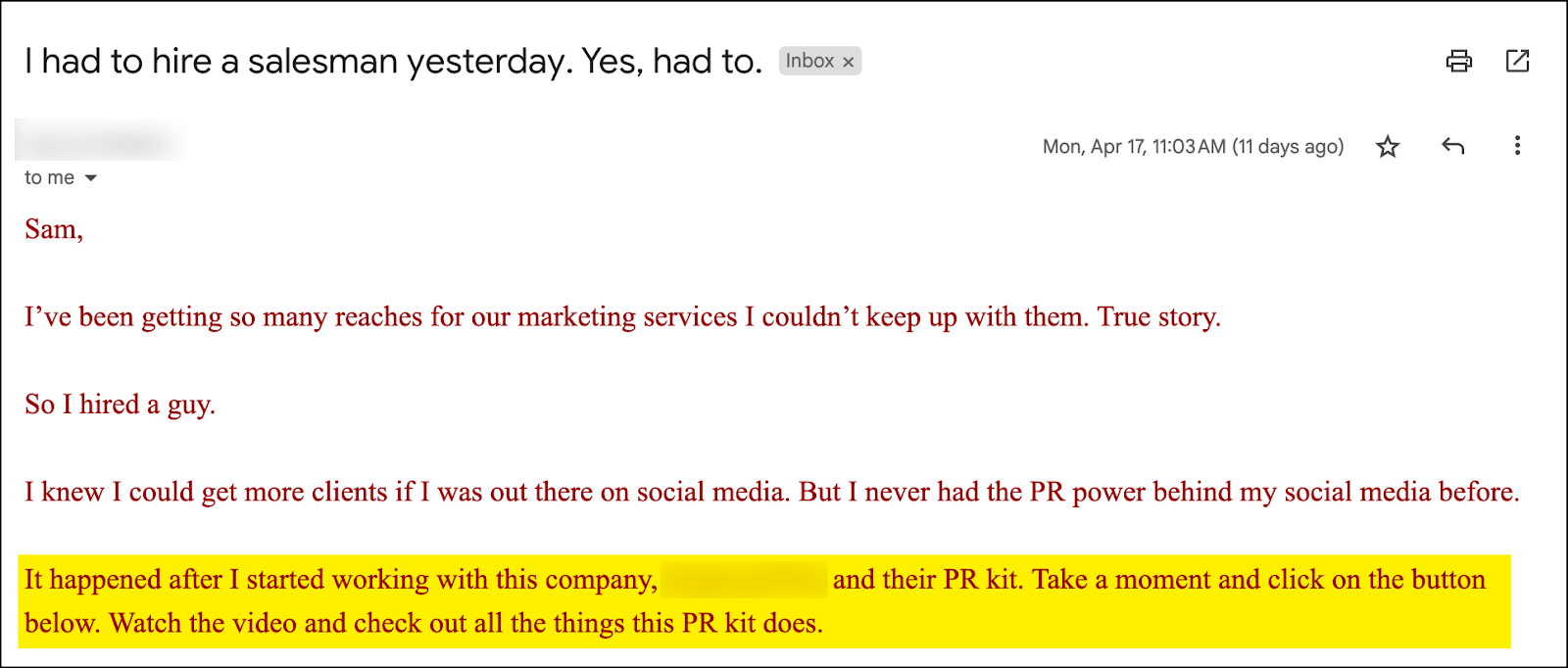
This isn’t much of a story.
Rather than take me on a journey, this email jumps right into telling me how “it happened.” From there, the emailer directs me to watch a video to learn about what the kit does.
The email started with so much promise for storytelling — I thought I was going to get to see this journey from struggling to hiring a salesperson. Instead, they gave me the ending but haven’t given me much else. I’m left unfulfilled by this story. I’m not relating to it. I’m not hooked.
My rewrite
I invested in a new website and SEO. No luck.
I tried Google Ads and Facebook Ads. Spent a fortune, didn’t have much to show for it.
I even bit the bullet and a big time PR agency. They got my name out there… but no one was calling.
Then, one day, when I was standing in line at the grocery store, a random thought popped into my head and I posted it on LinkedIn. Two hours later, I got a call. Someone who saw my post wanted to hire me. The next day, another call. Another client. Two clients from one sentence.
I immediately started experimenting with social media. And I found the more reach my posts got, the more calls I got. So I tested every social media promotion tool on the planet. They all flopped.
Until finally — finally — I found the ONE that worked.

I’m not doing anything revolutionary with the story here. I’m merely telling it in a relatable way — probably hitting a lot of points on the journey my prospect has hit. I’m giving my Star credibility.
And then, I set up the perfect epiphany moment. The Star has unexpected success! But that’s not the end of the Story. It’s a false victory. Because while the Star has the victory, it’s not sustainable.
So the Story continues. Now the Star is trying to replicate the success from their grocery store post. But they’re failing. All the tools are failing them. Until they find the one that works.
And thanks to the story I’ve told, thanks to the journey I’ve presented, thanks to the credibility I’ve acquired, thanks to the relatability I’ve engendered along the way — by the final sentence of the Story, the reader trusts me when I say I found the one and only one solution.
That’s what a good Story does in this type of cold email. Even if it takes extra words to get there.
3. Solution: The Mega Happy Ending That Solves Our Star’s Problem Once and For All
The Solution section of the email is the big reveal: Our Star was down on their luck, went on a journey, had an epiphany, and now… the happy ending!
In this section, you present the Solution that completely fixed the Star’s problem and made their life (or, at least, their business life) significantly better.
The Solution section can take different forms, depending on how your story goes. You may want to include any of the following:
- Hard numbers that show results
- A link to a case study
- A list of benefits (or other major benefits)
- Social proof
- A definition of success
Ultimately, you want the Solution section to be aspirational for your recipient. However you present the Solution — your recipient should crave that result for themselves.
Your recipient is currently in the “Before” world. The Solution is the “After” world. Make the “After” world so enticing that they can’t resist working with you to get there.
Putting together the Solution portion of a cold email
Here’s the Solution from the example email I received, as well as my rewritten version.
The Solution in the original email I received
Message: This is what they create (though a friend of mine shot the video).
They have various programs available with which you can use this kit.

Structurally, the Solution portion of this email are the two lines I’ve highlighted here. Although really, they led with the Solution in their subject line and opening — the Solution is hiring a salesperson to handle all the inbound leads.
As I mentioned earlier, I like that as a Solution. I wish they structured the email differently, so the solution was here, in its more logical place, at the end of the Story. But it’s a good Solution.
Needing to hire a salesperson is a compelling definition of success for the product this email is selling. Yes, the email takes a roundabout path to selling the product. But the cold emailer is striking a good chord with the Solution.
He just didn’t put it in the right spot.
My rewrite
[redacted]’s social media PR kit is a set of software tools I now use to promote my posts and grow my accounts. They use techniques I’ve never seen anywhere else to find targeted followers, influencers, and audiences.
In fact, it’s gone so well, I had to hire a salesperson yesterday. Yes, had to. I’ve been getting so many people reaching out about my services I couldn’t keep up.
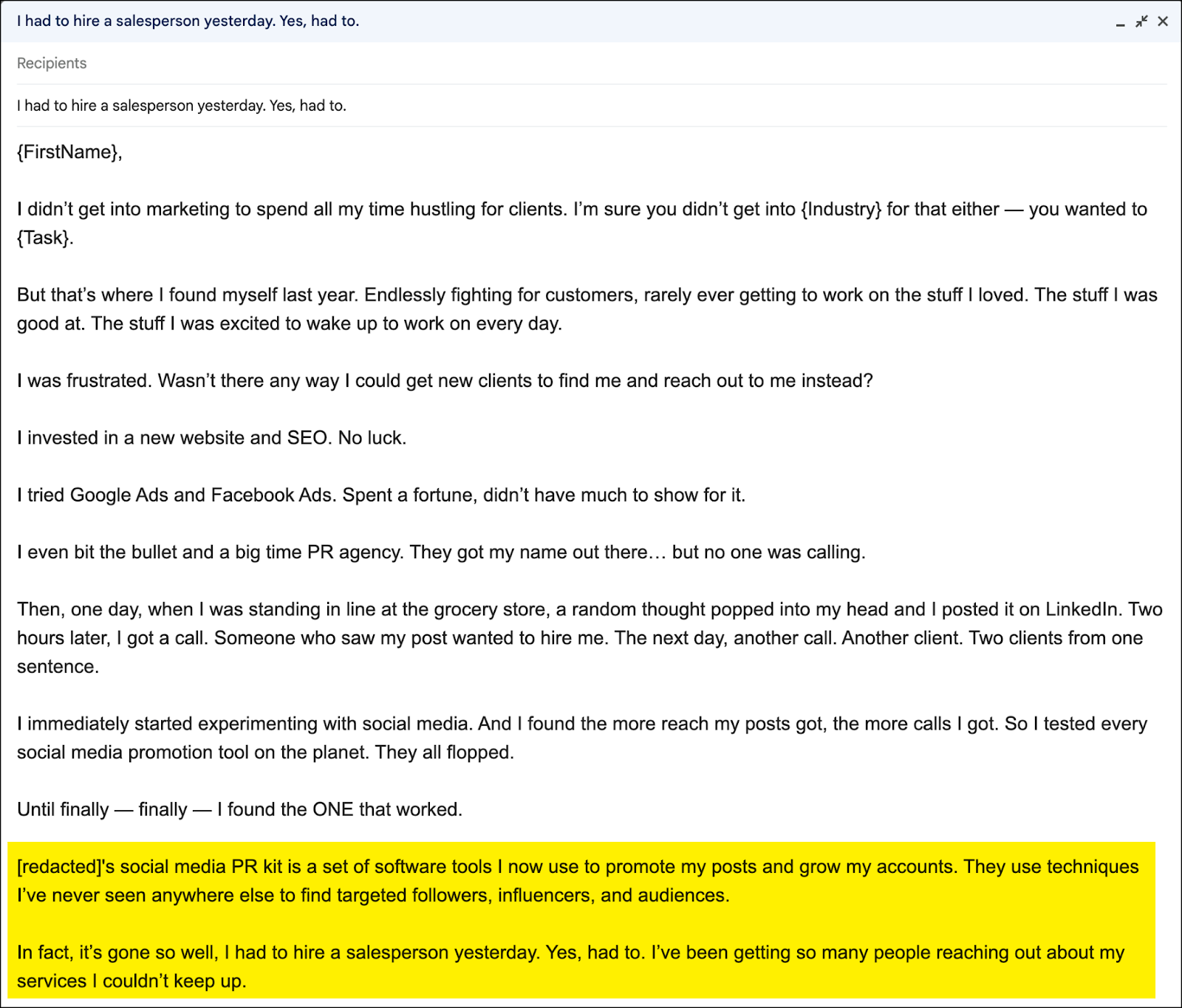
In my Solution, I reveal the software and give a quick description of what it is — something I felt was missing from the original email. I also give a one-sentence differentiator, which I felt was necessary in a competitive product field.
And then I bust out the ultimate Solution line, about the salesperson. I’m using it in the right spot here for maximum impact.
(Though I got rid of the sentence from the original email where he says, “True story.” It’s a personal thing, but I always avoid using lines like “true story” or “honestly” in my sales copy. I feel like that implies everything else you’re saying might or might not have been honest.)
4. Call-to-Action: With the Problem Solved, Time to Close the Deal
Now that you’ve told your story with a beginning, middle, and end, it’s time to exit the storytelling world and jump fully into the sales copywriting world. You need to offer up a call-to-action so the email recipient knows what to do next.
You can use any call-to-action technique here; whichever works best for you and your offer.
Urgency and/or scarcity are always best — as long as they’re credible.
You could always go with a more casual call-to-action, like asking someone to reply to learn more, or to schedule a meeting to discuss. (Or even to click a link to watch a video.)
However, after a Star Story Solution email, you’ve generally earned a bigger investment from someone. They now know your story and feel like they know you a little better. You’ve opened up to them. This is a situation where you can feel more emboldened to jump right to scheduling a sales call or a demo — you can skip the “getting to know you” soft CTA step, since they already got to know you via the storytelling.
Putting together the call-to-action portion of a cold email
Here’s the call-to-action from the example email plus my rewritten call-to-action.
The CTA in the original email I received
Message: Call them and check it out for yourself. Ask for [redacted], he’s the president and a friend ([redacted]). Tell him I recommend you.
And / or, check out their service at the link below.
It’s not often that I find something this effective. That’s why I’ve been communicating so much about it to friends and associates.
Note: At the risk of sounding like a used car salesman, on Friday the company told me that on May 1st, they are raising the price on the kind of social media kit I have from $400 to $499. $99 may or may not be a big deal to you, but wanted you to know.
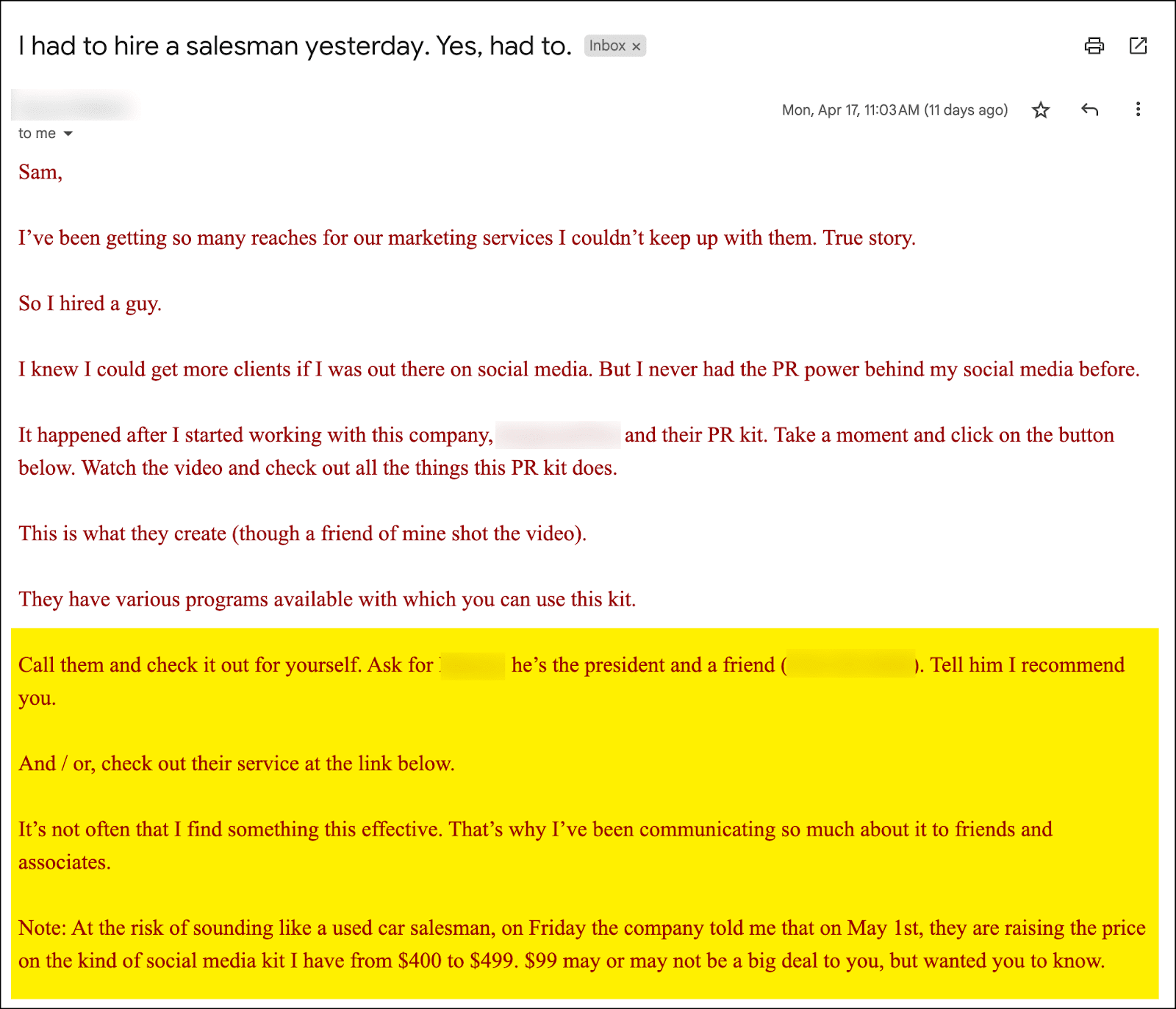
This email has a long call-to-action section. And it’s not even the only call-to-action; earlier in the email, he encourages me to click to watch a video.
The CTA is too scattered here. Am I supposed to watch the video, call this company and ask for his friend, or check out their services at the link below?
Regardless, he wants me to take action soon because he throws in the urgency-driven section about the price increase.
I’m a salty old veteran of cold email, so I smell B.S. immediately here; it might work on some people however. (Though I suspect even he knows it’s a weak attempt at creating urgency, which is why he distances himself from the bit with that “used car salesman” framing.)
My rewrite
Let’s get you on the path to hiring your own salesperson.
Take a look at this site I set up. You can see a video there of everything the PR kit does and grab a time to chat with me on that same page.
(Try to do it soon, too, [redacted] has raised their prices the past two summers so I’m guessing it’s going to jump again this year.)
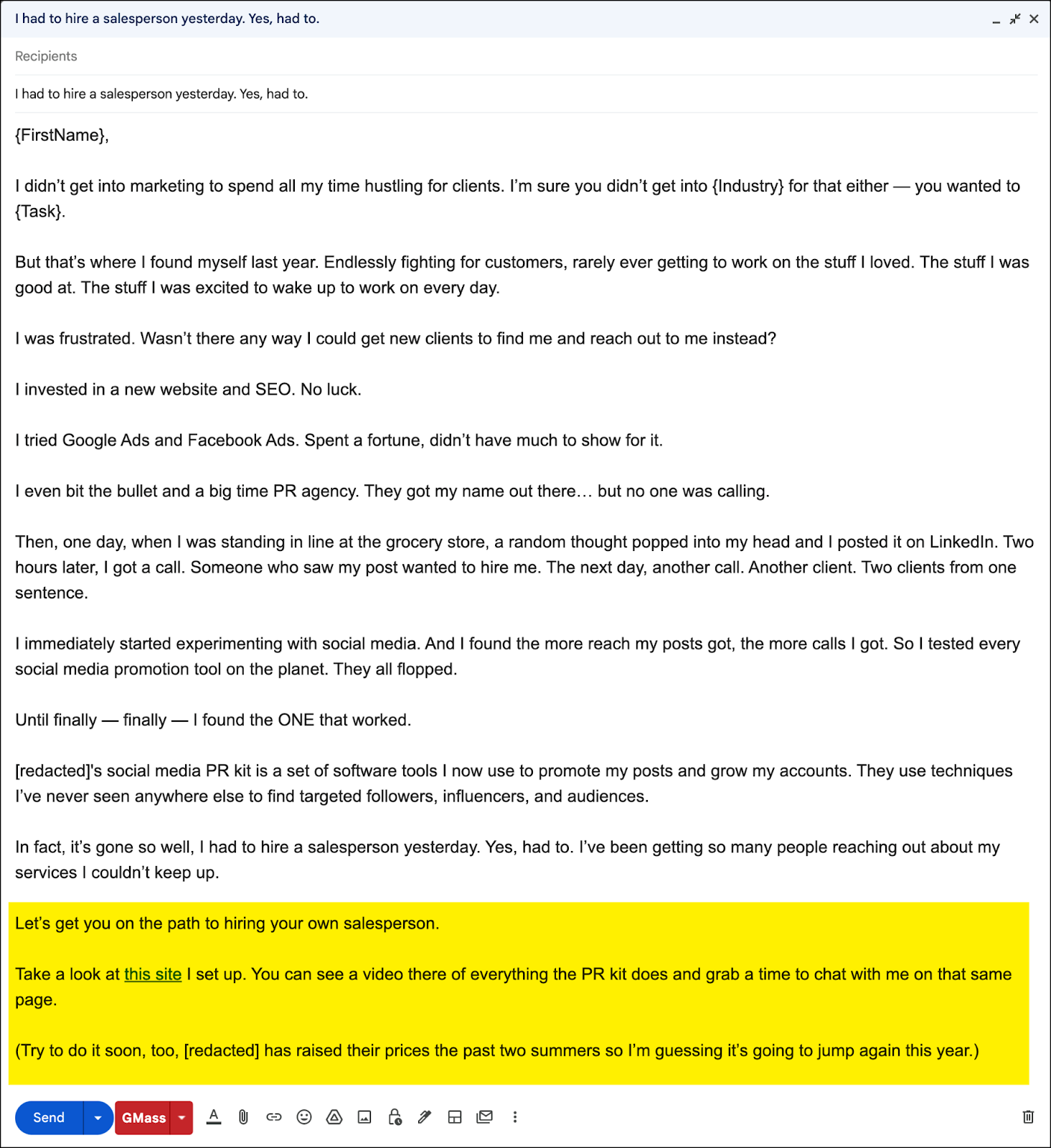
I added a one-line transition to complete the jump from the Story being about the Star to being about the prospect — I tell the prospect I want to get them their salesperson.
Then, because I felt this product does require a video demo, I went with the landing page call-to-action. Here I’ll send them to a page with a video demo along with a Calendly embed where they could book a meeting.
I feel quite confident in my Star Story Solution copy, so much so that I might not even include an urgency trigger. However, since I’m rewriting the email I received, I decided to stick with the original sender’s plan and create a sense of urgency.
I aimed for urgency phrasing that felt more realistic and honest and less sales-y in mine; more of an “insider tip” approach than the “used car sales” approach.
Also: I’d almost certainly use a cold email signature here. This email is just begging for a picture of you to really round out the story.
“The Sequel”: Automated Follow-Up Ideas for Star Story Solution
Here’s an idea for your automated follow-up messages to your Star Story Solution cold emails.
Give us the sequel — just minus the drama.
In your first follow-up, it’s great if you can give evidence how you’re continuing to thrive thanks to the Solution. Ideally, you’re soaring to even greater heights.
If you can give a quick “sequel” story in your automated follow-up, you’ll continue to reinforce the initial story — and continue to push the recipient to take action.
So, using my example above, the emailer could send an automated follow-up like this:
It just keeps working.
Remember how I told you about the salesperson I hired? Even he’s getting overwhelmed now too. April is going to be my biggest month ever — and May already looks like it’s going to be bigger.
Don’t worry. I have a very small list of clients I still want to work with, and I’m leaving room for you and {BusinessName}. Grab a time here (https://website.com) so we can talk!
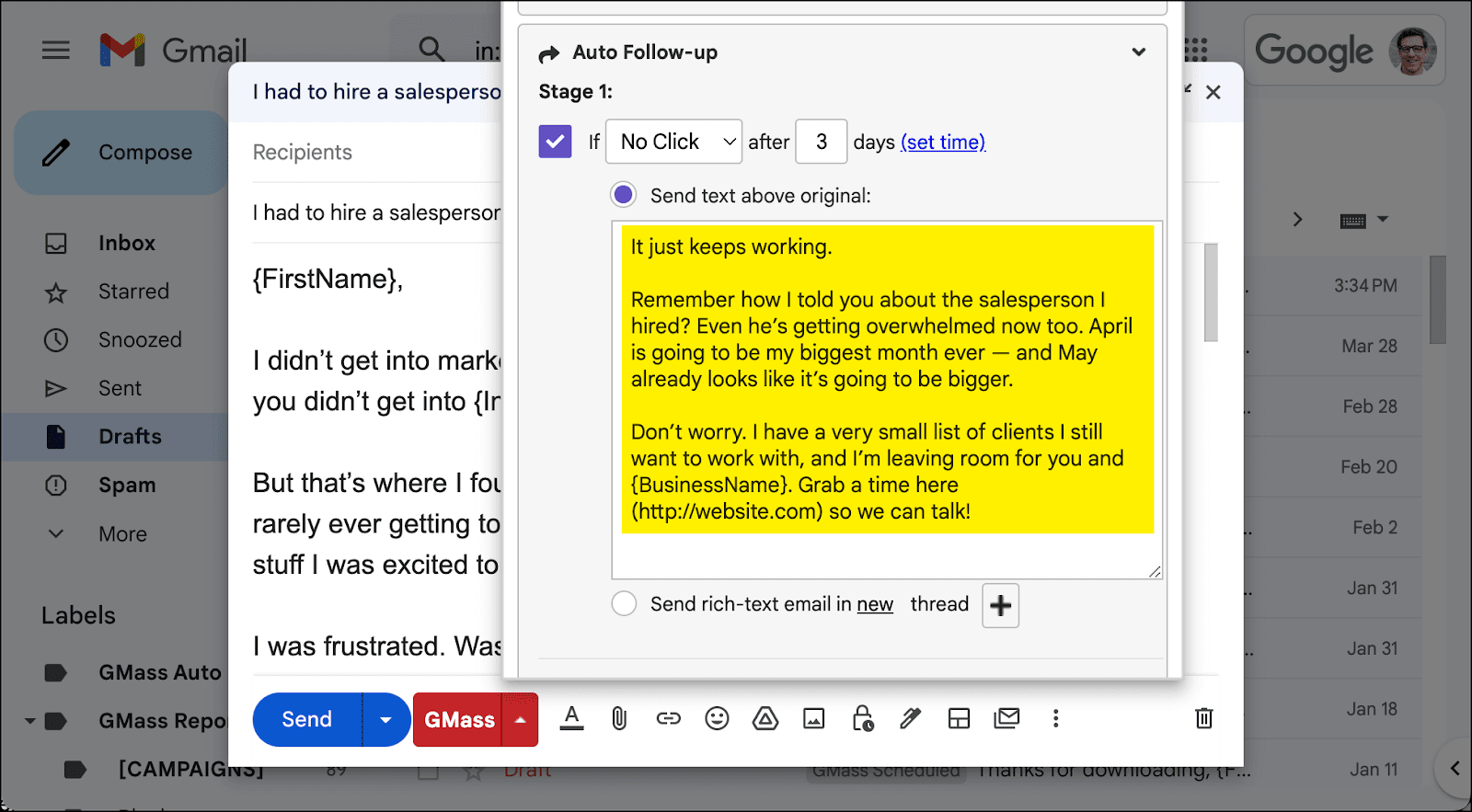
Star Story Solution Copywriting for Cold Email: Takeaway and Next Steps
The Star Story Solution copywriting method is a cold email technique that uses traditional storytelling beats in a sales context to evoke a personal and emotional response.
The method works best when you can describe your own journey — how you were once mired in the same problems as your recipient but found your way out.
Star Story Solution breaks from most other cold email copywriting methods in that it’s looser in structure, often goes longer, and gives much more room for improvisation.
However, when you tell a compelling story — and keep it personalized enough that your recipient can truly put themselves in the shoes of the Star — it can be a fast way to forge a powerful, personal connection with a new lead.
To review, the elements of Star Story Solution are:
- The Star. The main character of the story — generally you, serving as an avatar for the customer.
- The Story. Identify the problem your Star (and email recipient) is facing. Discuss the journey your Star took to fix the problem: The failed attempts, false hope, and then, the epiphany and discovery of the answer.
- The Solution. Share the one and only hard-earned solution to the problem.
- The call-to-action. Now that you’ve revealed the solution, give the recipient a chance to take action to get that solution for themselves.
Now, as is my tradition in my articles on copywriting techniques, I’ll use Star Story Solution to explain why you should use GMass as the cold email platform to send your Star Story Solution outreach campaigns.
1,000 cold emails sent. 8% open rate. 2 replies. No leads.
I couldn’t believe it. It happened to me again.
I was spending a fortune on cold email software. It was too complicated to teach my team or a VA, so I did everything myself. And after all that, my results weren’t just bad. They didn’t exist.
I felt trapped. Every time I wanted to switch to a different platform, it felt like I’d have to learn a whole new complex system. And who even knew if they’d have the features I wanted. Or if my emails would wind up in people’s inboxes (I was pretty sure I was always going to spam).
I asked everyone I knew in the sales world what they were using. And one name kept coming up over and over. Not from the people who always chase the trendiest new thing or who like to overspend their company’s VC-funded budget. From the people I trust the most. The real pros.
“GMass.”
I checked it out. OK, 300,000+ active users… that’s a good sign. 4.8-star average across 7,200+ reviews… that’s a very good sign.
So I gave it a shot.
There was no learning curve. It worked right inside Gmail — I didn’t have to learn any new software. Everything was intuitive and easy. My team could also learn it in minutes.
Any feature I wanted, I found. Quick automated follow-ups. Scheduling. Recurring campaigns. A/B testing. Full analytics. I could even break Gmail’s sending limits if I wanted to.
And… GMass cost so much less than my old, expensive cold email software.
But the real test would come when I sent my emails. The deliverability was everything. GMass says 99% of users report the best deliverability they’ve ever had — and I get why. The emails go through Google’s servers. They have a Spam Solver that catches problems before your campaigns go out. They gave me a custom tracking domain with free SSL.
I had to see it in action myself though.
The results? 1,000 cold emails sent. 42% open rate. 48 replies. More than two dozen leads. My calendar was full for the next two weeks straight.
And you can get started on a free trial of GMass with no credit card required — you don’t even have to fill out a form. Just download the Chrome extension and you’ll be up and running in minutes. (The quickstart guide can also walk you through the initial steps if you want).
You’ll be sending your first Star Story Solution cold email campaign in minutes.
Email marketing. Cold email. Mail merge. Avoid the spam folder. Easy to learn and use. All inside Gmail.
TRY GMASS FOR FREE
Download Chrome extension - 30 second install!
No credit card required









